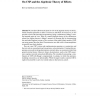Free Online Productivity Tools
i2Speak
i2Symbol
i2OCR
iTex2Img
iWeb2Print
iWeb2Shot
i2Type
iPdf2Split
iPdf2Merge
i2Bopomofo
i2Arabic
i2Style
i2Image
i2PDF
iLatex2Rtf
Sci2ools
100
click to vote
CORR
2010
Springer
2010
Springer
On CSP and the Algebraic Theory of Effects
We consider CSP from the point of view of the algebraic theory of effects, which classifies operations as effect constructors and effect deconstructors; it also provides a link with functional programming, being a refinement of Moggi's seminal monadic point of view. There is a natural algebraic theory of the constructors whose free algebra functor is Moggi's monad; we illustrate this by characterising free and initial algebras in terms of two versions of the stable failures model of CSP, one more general than the other. Deconstructors are dealt with as homomorphisms to (possibly non-free) algebras. One can view CSP's action and nondeterminism operators as constructors and the rest, such as concealment and concurrency, as deconstructors. Carrying this programme out results in taking deterministic external choice as constructor rather than general external choice. However, binary deconstructors, such as the CSP concurrency operator, provide unresolved difficulties. We conc...
Related Content
| Added | 09 Dec 2010 |
| Updated | 09 Dec 2010 |
| Type | Journal |
| Year | 2010 |
| Where | CORR |
| Authors | Rob J. van Glabbeek, Gordon D. Plotkin |
Comments (0)

